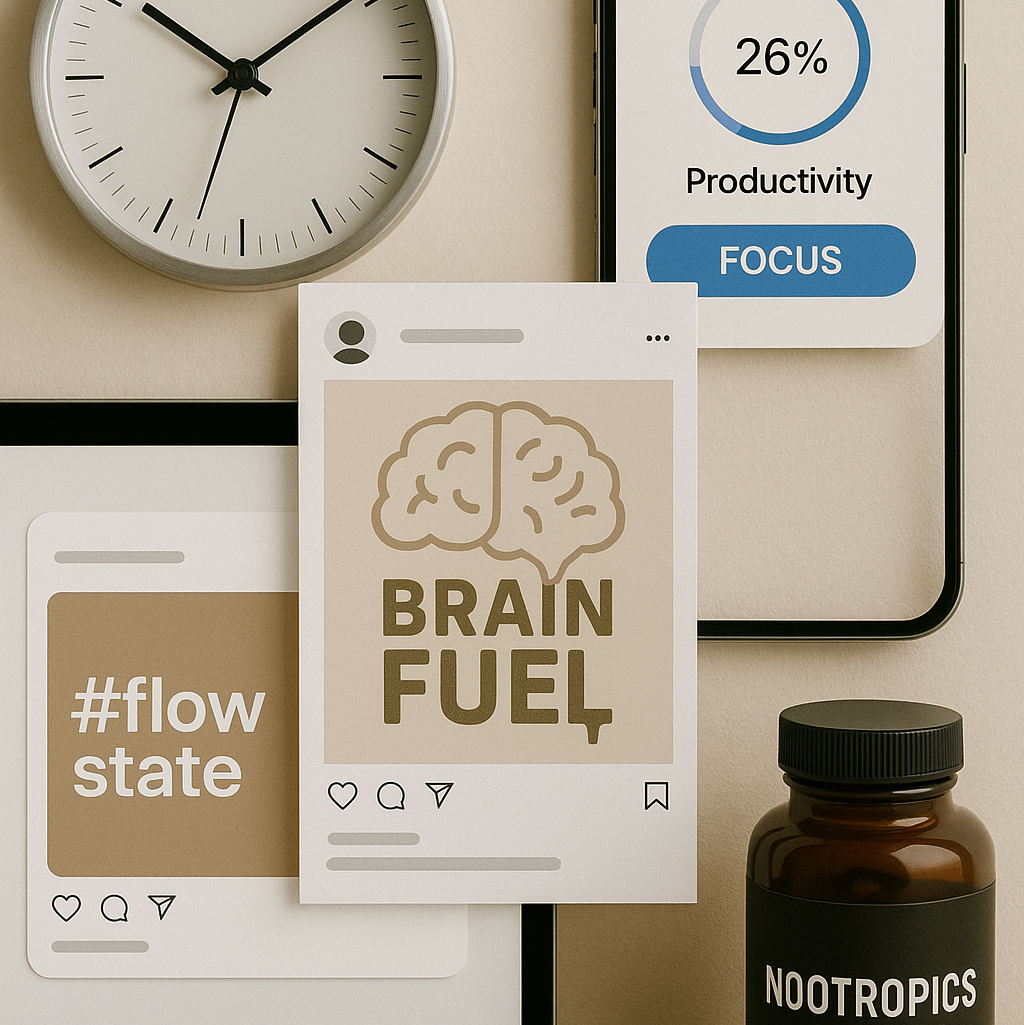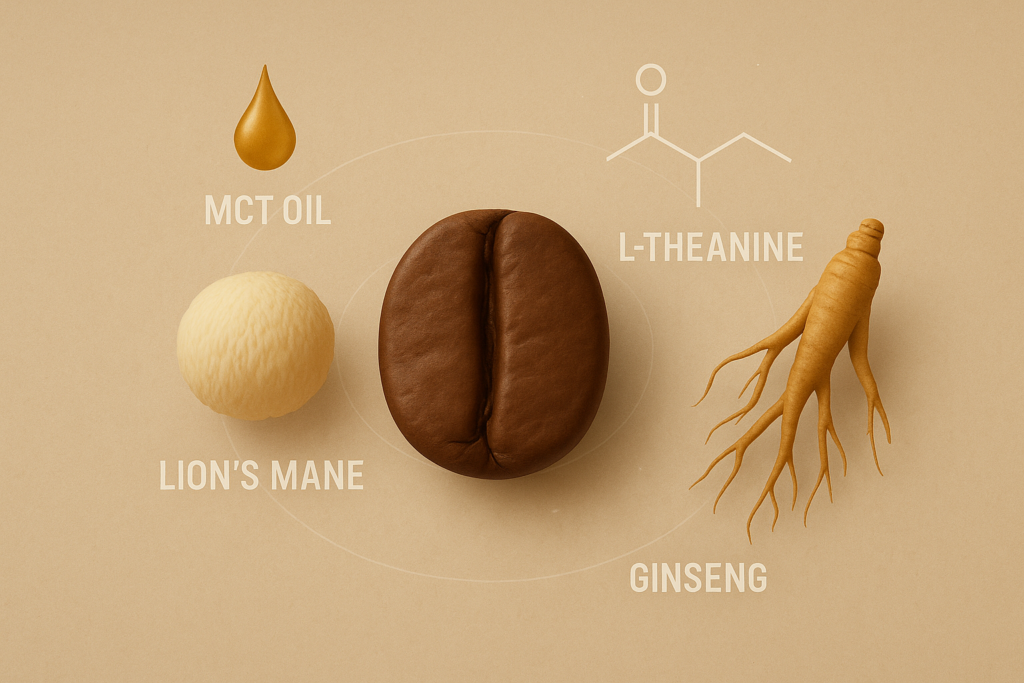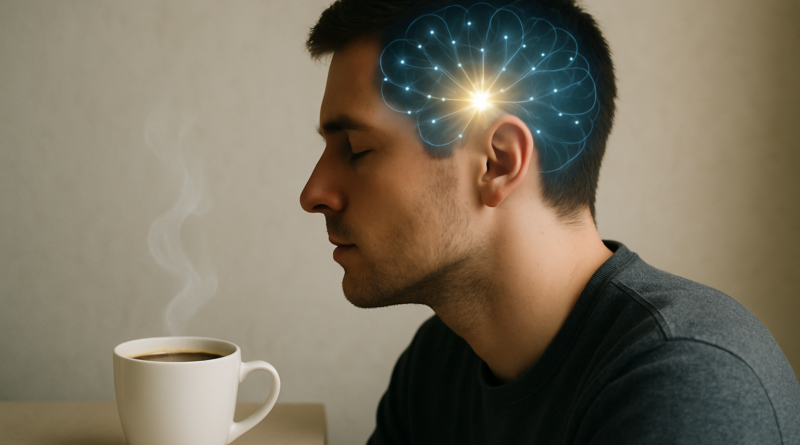Nootropic Coffee: Can It Really Boost Your Focus and Energy?
Why Nootropic Coffee Is Suddenly Everywhere
Nootropic coffee is having a moment. It’s showing up in influencer morning routines, on wellness store shelves, and in the hands of productivity-focused professionals. And it’s easy to see why. In a world that prizes mental sharpness and demands constant focus, a cup of coffee that promises to enhance your brain—not just wake you up—feels almost too good to ignore.
The term “nootropic” might sound like it belongs in a neuroscience journal, but its meaning is straightforward: a substance that may support or enhance cognitive function. That includes attention, memory, mental clarity, even mood. Until recently, nootropics were mostly found in supplement form—capsules, powders, or adaptogen blends sold under names like “Brain Fuel” or “Focus Stack.” Now, they’re migrating into something far more familiar: your morning brew.

What’s Really Inside a Cup of Nootropic Coffee?
Despite the growing buzz, there’s no single formula that defines what nootropic coffee must contain. Think of it more as a spectrum. On one end, there’s your usual black coffee. On the other, you’ve got elaborate blends infused with everything from mushrooms to amino acids to medium-chain triglycerides. Most nootropic coffees fall somewhere in between—coffee as the base, with carefully chosen ingredients added to support mental clarity, sustained energy, or reduced stress.
One of the most common additions is L-theanine, an amino acid found in green tea. L-theanine is best known for its calming effects. What makes it particularly interesting is how it interacts with caffeine. Studies have shown that when the two are combined, they may improve attention and focus, while also reducing the jitteriness that caffeine can sometimes cause (Haskell et al., 2008).
Another popular addition is MCT oil—short for medium-chain triglycerides. MCTs are a type of fat that the body can convert into ketones, which the brain can use as fuel. While MCT oil won’t directly make you smarter, it may support longer-lasting energy without the spikes and crashes of sugar or simple carbs. This is a staple in the “Bulletproof” coffee movement, which you can read more about in our article on how MCT oil makes Bulletproof coffee even better.
Then there are functional mushrooms—especially Lion’s Mane. This shaggy-looking mushroom has been studied for its potential to stimulate nerve growth factor (NGF), a protein that plays a role in learning and memory. While research is still early-stage, there’s growing interest in Lion’s Mane as a brain-supportive ingredient, and it’s a central feature in many nootropic coffee blends. We’ve covered it more in-depth in our article on Lion’s Mane coffee.

Some blends also feature adaptogens like Rhodiola rosea or Panax ginseng—plants that are believed to help the body manage stress and maintain energy levels under pressure. Others include amino acids like N-acetyl L-tyrosine, which may support the production of dopamine and other neurotransmitters involved in motivation and alertness. The goal isn’t just stimulation. It’s synergy—bringing together ingredients that complement caffeine to create a smoother, more focused kind of energy.
What the Science Actually Says About Focus and Energy
It’s one thing to list promising ingredients—but do these brain-boosting brews really work? The short answer: some of the science looks promising, but it’s not all equally strong.
Caffeine is, of course, well-researched. It’s one of the most widely consumed psychoactive substances in the world, and it consistently shows benefits for alertness, reaction time, and short-term memory. But what happens when you combine caffeine with nootropics?
Multiple clinical studies have shown that combining L-theanine with caffeine can improve cognitive performance, focus, and alertness, while reducing the jitteriness and mental fatigue often associated with caffeine alone (Haskell 2008, Giesbrecht 2010, Owen 2008). One clinical trial found that the combination helped improve accuracy during task-switching and reduced susceptibility to distraction. Another study noted that participants reported feeling more alert and less jittery than with caffeine alone. These effects appear most pronounced in people under cognitive stress—like multitasking, exam-taking, or sleep deprivation.
Lion’s Mane mushroom is another standout ingredient that’s getting attention for its potential to support long-term brain health. A 2023 study published in the International Journal of Molecular Sciences found that compounds in Lion’s Mane may promote neurogenesis—the growth of new brain cells—although much of the existing research is still preclinical (International Journal of Molecular Sciences, 2023). Small human trials have shown possible benefits for memory and mild cognitive impairment, but the evidence is far from conclusive.

When it comes to MCT oil, the benefits are a bit more metabolic than mental. MCTs are absorbed quickly and can be converted into ketones—an alternative fuel source for the brain. While this doesn’t translate directly to sharper thinking, some people report fewer energy dips and better mental endurance when they include MCTs in their routine. Whether that’s due to the ketones themselves or simply more stable energy levels is still being explored.
Adaptogens like Rhodiola or Ginseng have a longer history of traditional use, and some modern studies support their role in reducing mental fatigue. A 2017 open-label clinical trial published in Complementary Medicine Research found that Rhodiola rosea supplementation helped participants maintain concentration during prolonged, stressful tasks, with significant improvements observed over an eight-week period (Complementary Medicine Research, 2017). However, as with many herbal supplements, results vary between individuals, and not all studies have been able to replicate these effects.
Overall, nootropic coffee isn’t magic—but it may offer a real edge, especially when thoughtfully formulated.
Real Benefits or Just Clever Marketing?
There’s no denying that nootropic coffee sounds impressive—maybe even too impressive. Promises of laser-sharp focus, all-day energy, and stress resistance can start to blur the line between realistic benefits and clever marketing. So what’s actually happening when someone feels better after drinking a cup of nootropic-infused brew?
In many cases, the effects are real—but not always for the reasons we think. Caffeine alone can create a significant improvement in focus and motivation, especially in people who are sleep-deprived or under pressure. Adding ingredients like L-theanine or Lion’s Mane might enhance that effect slightly or make it smoother. But for someone already well-rested and healthy, the difference can be subtle.
However, it’s important to stay grounded. Drinking a nootropic coffee blend won’t suddenly triple your productivity or unlock untapped potential. It’s not going to replace good sleep, a balanced diet, or managing your stress. What it can do—especially for people juggling a demanding schedule—is offer a gentle lift. A more stable kind of focus. A less jittery energy curve. That might sound subtle, but for the right person, it can be a noticeable and welcome change.
Who Actually Benefits from Nootropic Coffee?
Nootropic coffee tends to benefit people who rely on deep mental focus for long stretches—like students studying for exams, creatives balancing flow with deadlines, or professionals managing packed schedules. If you’re looking for more sustained focus without the typical caffeine crash, it might offer a real edge.
On the other hand, it’s less suited for those who are sensitive to stimulants, prone to anxiety, or struggle with sleep. These blends can be surprisingly strong, especially when multiple active ingredients are combined. In those cases, even a “smart” coffee can feel like too much. Ultimately, nootropic coffee works best as a boost—not a Band-Aid. If your baseline is solid, it can sharpen your edge. But it won’t fix burnout or replace rest.

Should You Try It?
If you’re already in the habit of starting your day with coffee, adding a functional twist could be a low-effort way to test what nootropic ingredients might do for you. In the best-case scenario, you’ll find a blend that helps you feel more focused, more calm, and more productive—without the common caffeine crash. At worst, you’ll just go back to your regular brew.
What makes nootropic coffee compelling isn’t just the ingredients or even the science. It’s the idea that something so simple and familiar—your morning cup—can be gently enhanced to better support how you want to feel and function. Not transformed, not hacked—just optimized.
So, can nootropic coffee really boost your focus and energy? In many cases, yes—at least a little. Just don’t expect it to do the work for you. Think of it as an assistant, not a replacement. And as with most things in wellness, the most meaningful improvements come not from any one product, but from what you build around it.

